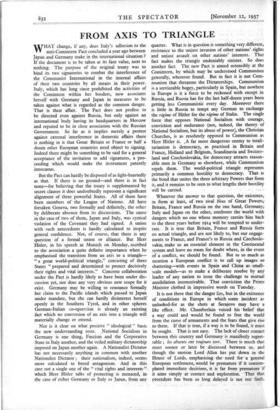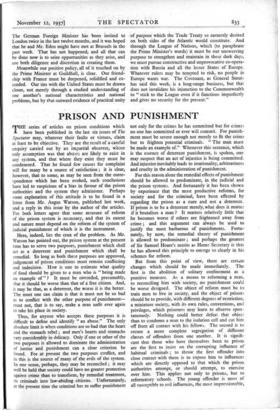FROM AXIS TO TRIANGLE
WHAT change, if any, does Italy's adhesion to the anti-Comintern Pact concluded a year ago between Japan and Germany make in the international situation ? If the document is to be taken at its face value, next to nothing. The purpose of the original treaty was to bind its two signatories to combat the interference of the Communist International in the internal affairs of their two countries by all means in their power. Italy, which has long since prohibited the activities of the Comintern within her borders, now associates herself with Germany and Japan in measures to be taken against what is regarded as the common danger. That is their affair. The Pact does not profess to be directed even against Russia, but only against an international body having its headquarters in Moscow and reputed to be in close association with the Russian Government. So far as it implies merely a protest against external interference in domestic affairs there is nothing in it that Great Britain or France or half a dozen other European countries need object to signing. Indeed there might be something to be said for a general acceptance of the invitation to add signatures, a pro- ceeding which would make the instrument patently innocuous.
But the Pact can hardly be disposed of as light-heartedly as that. If there is no ground—and there is in fact none—for believing that the treaty is supplemented by secret clauses it does undoubtedly represent a significant alignment of three powerful States. All of them have been members of the League of Nations. All have forsaken Geneva, two formally and definitely, the other by deliberate absence from its discussions. The cause in the case of two of them, Japan and Italy, was cynical violation of the Covenant they had signed. A union with such antecedents is hardly calculated to inspire general confidence. Not, of course, that there is any question of a formal union or alliance. But Herr Hitler, in his speech at Munich on Monday, ascribed to the association a quite definite importance when he emphasised the transition from an axis to a triangle- " a great world-political triangle," consisting of three States " prepared and determined to protect decisively their rights and vital interests." Concrete collaboration under the. Pact is hardly likely to have been under dis- cussion yet, nor does any very obvious new scope for it exist. Germany may be willing to renounce formally her claim to the Pacific islands which passed to Japan under mandate, but she can hardly disinterest herself openly in the Southern Tyrol, and in other spheres German-Italian co-operation is already an existing fact which no conversion of an axis into a triangle will materially change or extend.
Nor is it clear on what positive " ideological " basis the new understanding rests. National Socialism in Germany is one thing, Fascism and the Corporative State in Italy another, and the veiled military dictatorship imposed on Japan another again. A Nationalist Dictator has not necessarily anything in common with another. Nationalist Dictator ; their nationalism, indeed, seems more calculated to breed antagonism. And in this case not a single one of the " vital rights and interests " which Herr Hitler talks of protecting is menaced, in the case of either Germany or Italy or Japan, from any quarter. What is in question is something very different, resistance to the unjust invasion of other nations' rights and unjust assault on other nations' interests. That fact makes the triangle undeniably sinister. So does another fact. The new Pact is aimed ostensibly at the Comintern, by which may be understood Communism generally, wherever found. But in fact it is not Com- munism that threatens the Dictatorships. Communism is a serviceable bogey, particularly in Spain, but nowhere in Europe is it a force to be reckoned with except in Russia, and Russia has for the last half-dozen years been getting less Communistic every day. Moreover there is little in Russia to tempt any German to exchange the regime of Hitler for the regime of Stalin. The single force that opposes National Socialism with courage, conviction and endurance (not, indeed, the theory of National Socialism, but its abuse of power), the Christian Churches, is as resolutely opposed to Communism as Herr Hitler is. A far more dangerous enemy to totali- tarianism is democracy, as practised in Britain and France, Holland and Belgium, Scandinavia and Switzer- land and Czechoslovakia, for democracy attracts reason- able men in Germany as elsewhere, while Communism repels them. The world-political triangle represents primarily a common hostility to democracy. That is the bond that unites the three arbitrary Powers that form it, and it remains to be seen to what lengths their hostility will be carried.
Whatever the answer to that question, the existence, in form at least, of two rival blocs of Great Powers, Britain, France and Russia on the one hand, Germany, Italy and Japan on the other, confronts the world with dangers which no one whose memory carries him back to the three years before 1914 will be tempted to under- rate. It is true that Britain, France and Russia form no actual triangle, and are not likely to, but our engage- ments to France, and France's to Russia and Czechoslo- vakia, make us an essential element in the Continental system and leave no room for doubt where, in the event of a conflict, we should be found. But to so much as mention a European conflict is to call up images so shattering—with events in Spain and China as small- scale models—as to make a deliberate resolve by any leader of any nation to issue the challenge to mutual annihilation inconceivable. That conviction the Prime Minister clothed in impressive words on Tuesday.
It is not there that the danger lies, but in the existence of conditions in Europe in which some incident as unlooked-for as the shots at Serajevo may have a like effect. Mr. Chamberlain voiced his belief that a way could and would be found to free the world from the curse of armaments and the fears that give rise to them. If that is true, if a way is to be found, it must be sought. That is not easy. The lack of closer contact between this country and Germany is manifestly regret- table ; les absents ont toujours tort. There is much that must sooner or later be discussed between us, and though the motion Lord Allen has put down in the House of Lords, emphasising the need for a general European settlement, would be premature if it contem- plated immediate decisions, it is far from premature if it aims simply at contact and exploration. That that procedure has been so long delayed is not Our 'fault. The German Foreign Minister has been invited to London twice in the last twelve months, and it was hoped that he and Mr. Eden might have met at Brussels in the past week. That has not happened, and all that can be done now is to seize opportunities as they arise, and use both diligence and discretion in creating them.
Meanwhile our positive policy, all of it touched on by the Prime Minister at Guildhall, is clear. Our friend- ship with France must be deepened, solidified and ex- tended. Our ties with the United States must be drawn closer, not merely through a studied understanding of one another's national characteristics and national problems, but by that outward evidence of practical unity - of purpose which the Trade Treaty so earnestly desired on both sides of the Atlantic would constitute. And through the League of Nations, which (to paraphrase the Prime Minister's words) it must be our unswerving purpose to strengthen and maintain in these dark days, we must pursue constructive and unprovocative co-opera- tion with Russia and all the lesser States of Europe. Whatever rulers may be tempted to risk, no people in Europe wants war. The Covenant, as General Smuts has said this week, is a long-range business, but that does not invalidate his injunction to the Commonwealth to " stick to the League even if it functions imperfectly and gives no security for the present."















































 Previous page
Previous page